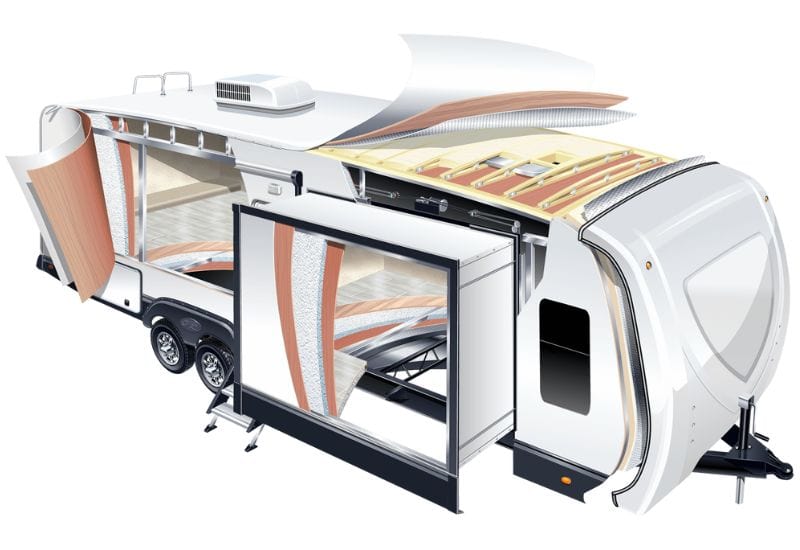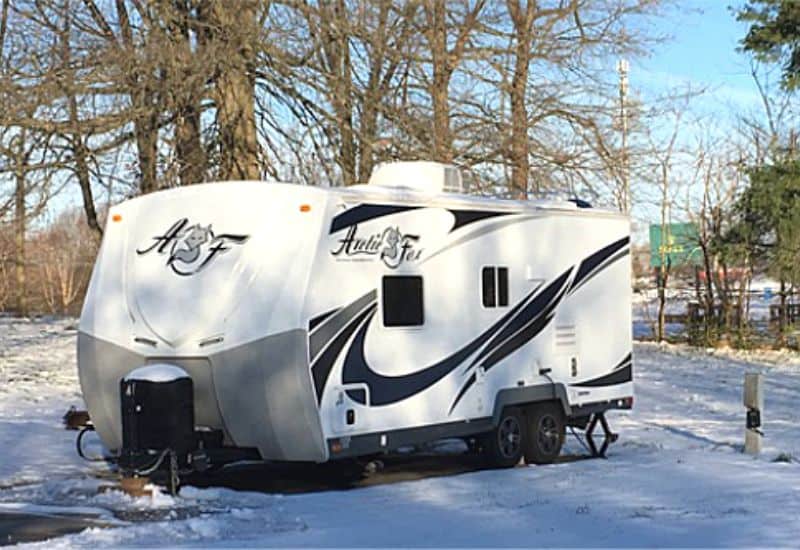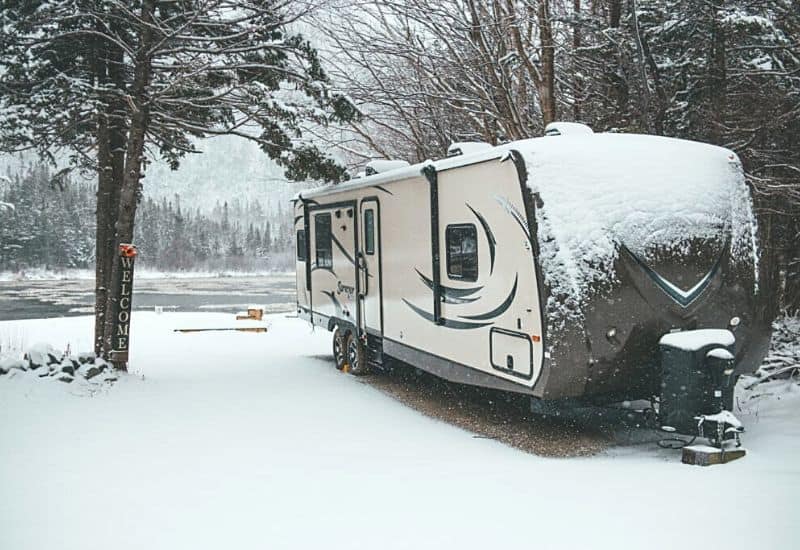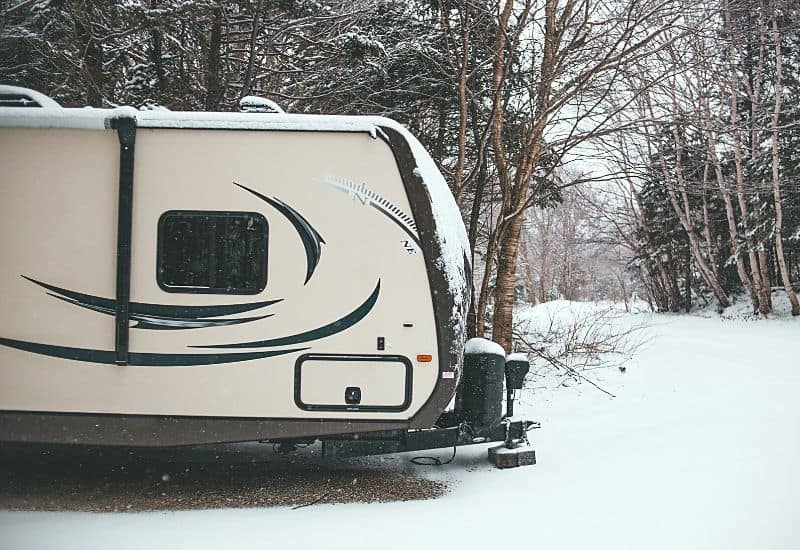Travel trailers are one of the best ways to get back to nature and explore the country, offering a unique blend of comfort and adventure.
However, as the seasons change and the cold winds of winter start to blow, many travelers are left wondering about the suitability of their trailers in colder climates.
The question of whether travel trailers are insulated for winter becomes a significant consideration for those who dream of camping in winter wonderlands.
This blog post aims to address this concern by diving into the specifics of travel trailer insulation.
We’ll examine the types of insulation used, the effectiveness of these materials in harsh winter conditions, and ways to enhance your trailer’s warmth and coziness.
Key Takeaways:
- Most travel trailers are not insulated nor rated for winter camping.
- Standard travel trailers typically have minimal insulation and are only designed for fair-weather camping.
- Travel trailers not rated for four-season camping must be winterized for camping, once temperatures drop below freezing, to avoid damage to the trailer’s plumbing system.
Understanding Insulation in Travel Trailers

Insulation in travel trailers plays a crucial role in creating a comfortable and habitable camper.
At its core, insulation is a material or combination of materials used to prevent the transfer of heat.
In the context of travel trailers, insulation works by minimizing heat loss during cold weather and keeping the interior cool in hot conditions.
In travel trailers, insulation is typically found in the walls, roof, and floor. The primary purpose is to maintain a steady interior temperature, regardless of the external weather conditions.
This not only enhances comfort but also improves energy efficiency by reducing the need for excessive heating or cooling.
The effectiveness of insulation is measured in terms of its R-value, which indicates the material’s resistance to heat flow. Higher R-values mean better insulation.
Common insulation materials used in travel trailers include fiberglass batt insulation, foam board, solar reflective insulation, and spray foam.
Each of these materials has its own set of properties that affect its insulating effectiveness, durability, and cost.
- Fiberglass insulation, often found in residential homes, is also used in many travel trailers, due to its affordability and good insulating properties.
- Foam board offers a higher R-value per inch compared to fiberglass, making it a popular choice for limited space.
- Solar reflective insulation reflects radiant heat, which enhances thermal regulation. In colder weather, this type of insulation helps to retain heat and adds an extra layer of thermal protection.
- Spray foam insulation, while more expensive, provides excellent coverage and seals gaps and crevices effectively, preventing drafts.
Are Travel Trailers Insulated for Winter?
Travel trailer insulation capabilities for winter and cold weather can vary widely, largely depending on the specific make and model of the camper.
Most travel trailers are equipped with minimal insulation only suitable for milder climates.
Often referred to as three-season trailers, they provide minimal fiberglass or foam board insulation, which is not designed to handle freezing temperatures found in winter.
There are, however, travel trailers designed specifically for all-season use, including the challenges of winter.
Referred to as four-season campers they are often equipped with enhanced insulation, dual-pane windows, and features like sealed and heated underbellies to prevent plumbing from freezing.
Popular Travel Trailers Insulated for Winter Camping

While most travel trailers are not insulated or designed for winter, there are campers built for four-season camping.
These specialized models come with enhanced insulation, robust heating systems, and features tailored for extreme weather conditions.
Making them ideal for those who want to camp year-round or full-time RV.
Be prepared to pay a premium though, as four-season campers are typically double or triple the price of a standard travel trailer.
Four-Season Travel Trailers
- Lance Travel Trailers
- Northwood Arctic Fox
- Grand Design Imagine
- Forest River Cherokee Wolf Pack
- Outdoors RV Travel Trailers
- Oliver Legacy Elite and Legacy Elite II
- Bigfoot Travel Trailers
- Dutchmen Aspen Trail
- Jayco Eagle
Cold Weather Travel Trailer Features that Allow for Winter Camping
Determining whether a travel trailer is capable of camping in winter, especially in below-freezing temperatures, is not always easy.
As the RV industry as a whole tends to throw around terms like “four-season” and “winter-ready” pretty loosely.
However, there are specific features that can indicate a trailer’s suitability for cold weather use, which I’ve outlined below.
- Robust Insulation: Extra insulation and higher R-value insulation in the trailer’s walls, roof, and floor.
- Enclosed and Heated Underbelly: A fully enclosed underbelly, ideally heated through the trailer’s furnace through ducting.
- Sealed and Insulated Plumbing: Extra insulation around the trailer’s plumbing.
- Tank Pad Heaters: Attached to water and waste tanks to prevent their contents from freezing.
- High-Efficiency Heating System: Robust, preferably ducted heating system capable of producing at least 30,000 BTUs.
- Heated and Enclosed Water Management Center: Prevents water connection points and controls from freezing.
- Heated and Enclosed Dump Valves: Prevents freezing of the RVs wastewater dump valves.
- Dual-Pane Windows: Improves the window’s R-value and helps to prevent condensation.
- Electric Fireplace With Heat: Provides an extra heating source.
- Large Propane Tank Capacity: Ensures a consistent and reliable fuel supply for heating, especially in colder climates where fuel demand increases significantly.
How Cold is Too Cold for a Travel Trailer?

For the majority of travel trailers, anything below freezing is too cold, unless the camper is four-season capable.
This is because standard travel trailers are typically not equipped with the insulation, heating systems, or cold weather features necessary to handle extreme cold.
Which can lead to damaged plumbing systems, frozen pipes/holding tanks, and potential water damage.
In contrast, four-season travel trailers are specifically designed with enhanced insulation, better heating solutions, and features like heated underbellies and enclosed dump valves to prevent freezing.
Making them suitable for use in freezing temperatures.
Even four-season trailers have their limits though, which is often around 0 degrees Fahrenheit.
Are Travel Trailers Well Insulated?
Travel trailers can vary quite a bit in how well they’re insulated.
Standard travel trailers, typically offer basic levels of insulation using materials like fiberglass or foam board.
This level of insulation is generally adequate for mild to moderate climates but is not enough to keep the interior comfortable in extremely hot weather or harsh winter conditions.
For those planning to camp in colder environments, four-season travel trailers are a better option.
Four-season campers are specifically designed for use throughout the year, including in cold weather.
They offer superior insulation capabilities, with higher R-values that provide better resistance to heat flow.
This means they are more effective at retaining heat in the winter and keeping cool in the summer.
Additionally, four-season trailers often come with other winter-friendly features like heated underbellies to protect plumbing from freezing and enclosed water management systems and dump valves for easier water and waste management in cold temperatures.
As well as double-pane windows, which offer an extra layer of insulation compared to the single-pane windows typically found in standard models.
Can You Make a Travel Trailer Winter-Proof?
If you’re starting with a standard travel trailer that is not rated for four-season camping, it’s going to be very challenging to make the trailer winter-proof without heavy modifications.
So much so that it would probably be better and even cheaper to replace your standard travel trailer with a four-season camper that’s capable of winter camping.
That being said, though, there are some things you can do to improve your trailer’s cold-weather capability and make it more comfortable to use in colder weather:
- Insulate Windows: Use thermal curtains or reflective foil insulation to minimize heat loss through windows.
- Add Skirting: Skirting around the base of the trailer can help reduce cold air infiltration and protect underbelly plumbing.
- Seal Gaps and Leaks: Use caulk or weatherstripping to seal any gaps or leaks around doors, windows, and joints.
- Insulate Pipes: Wrap pipes with fiberglass or wool insulation and heat tape to prevent them from freezing.
- Use Space Heaters: Portable space heaters can provide additional warmth but should be used cautiously to avoid fire hazards.
- Add Rugs or Carpets: Placing rugs or carpets on the floor can add an extra layer of insulation and keep your feet warm.
- Upgrade Your Bedding: Invest in heavy-duty, thermal, or down-filled blankets and comforters for added warmth while sleeping.
- Add an Electric Blanket: Use an electric blanket for extra warmth.
- Use Door Draft Stoppers: Place draft stoppers at the bottoms of doors to prevent cold drafts.
- External Tank Heaters: Attach external tank heaters to your water and waste tanks to prevent them from freezing.
- Thermal Blankets for Tanks: Wrap your water and waste tanks in thermal blankets for added insulation.
- Use a Dehumidifier: In cold weather, a dehumidifier can help control moisture levels inside the trailer, making the air feel warmer and more comfortable.
Can You Live in an RV in Freezing Temps?
If you plan to full-time in an RV, especially in freezing temperatures, the only way that’s possible is in a four-season RV.
These specialized RVs are designed to handle extreme weather conditions, providing adequate insulation, heating, and other features necessary for comfortable living in cold climates.
With a four-season RV, you get upgraded insulation in the walls, roof, and floor, and advanced heating systems that are capable of maintaining a cozy interior even in freezing temperatures.
Additional Cold Weather RV Resources:
- 10 Best 5th Wheels for Cold Weather Camping
- 10 Best 4-Season Toy Haulers for Cold Weather Camping
- Should You Cover RV Tires in the Winter? (Explained)
Recent Posts
Are you ready to hit the open road in your RV? Before you set off on your adventures, it's crucial to have the right RV travel tips and RV accessories up your sleeve. As a seasoned RVer, I've...
47 RV Storage Ideas to Maximize Your Space for Compact Living
Camping and living in an RV is an incredible adventure, but it comes with its fair share of challenges, particularly around storage, due to the lack of space. Because of this, it's a must to make...

